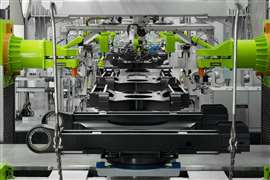Interview: Speedy Hire's Mark Rogerson
14 November 2014

Mark Rogerson was appointed chief executive of Speedy Hire in January, just weeks after revelations of accounting irregularities at the company’s Middle East business hit the headlines, forcing former chief executive Steve Corcoran to resign.
The company confirmed that the £4.8 million (€6.1 million) missing from its Middle East business was the result of deliberate actions of a small number of employees who have since left.
In fact, there has been wholesale change at the top of the organisation since the revelations, including the overhaul of the Middle Eastern management, a new group finance chief, a new chief operation officer, and the resignation of Speedy chairman Ishbel Macpherson.
Mr Rogerson, who joined Speedy from contractor Costain, said the new management had done a “herculean” job in the wake of the crisis.
“I am confident that we have some great people joining the business,” he said. “It is not our corporate responsibility to make prosecutions, and as far as I am concerned, that boil has been well and truly lanced. The people concerned have left the organisation; we have a brand new management team in place.”
Mr Rogerson added, “Looking back, I think everybody would recognise that it was the wrong business model in the Middle East. In my view, just taking the Speedy business model of tools and equipment to this market was flawed, there’s no bias for that in the Middle East.
“When you look at the contracting model for construction, the majority of the contractors are for instance Korean, Chinese and Indian contractors which don’t have the outsourced model that we do, they provide their own equipment. Where people want rental equipment is in very very specialist or niche areas – a good example is Lavendon, whose business is doing well in the Middle East. Why? Because it’s a niche business.”
Mr Rogerson added, “The question is, is there a sustainable business model for the traditional Speedy services and products in the Middle East? My deduction is probably not. However there is a broader services offering that organisations like Speedy could see as an opportunity.
“We are now looking at the various options in the Middle East, as you’d expect us to do. That part of the business is still losing us money, and it will continue to do so for a while.
"Therefore we’ve got to stand back and ask ourselves, which way do we now need to go? But I am as confident as I can be that we have addressed the legacy issues. Now we need to ask ourselves what we want of the Middle East business. “
Meanwhile, Mr Rogerson ruled out further international partnerships like the company’s 50/50 rental joint venture in Kazakhstan with Glasgow-based shipping, transport and oilfield services company J. & J. Denholm Group.
“I don’t think the bandwidth of the operation is there to look at other opportunities,” he said. “We are focussing on efficiency, but that doesn’t mean that I wouldn’t be willing to consider something if one of our strategic customers came and asked us to help.”
Efficiency
Speedy’s drive to improve its operational efficiency has been well-documented – the company is completely restructuring its depot network, transforming a national network of more than 400 ‘standard’ locations to a much smaller, three-tier network with seven Multi Service Centres, 40 Superstores and 130 to 170 local Express locations.
And the efforts already seem to be paying off, with Speedy reporting a 16% jump in revenues for the first quarter of financial 2014. Mr Rogerson said, “We are focussing on all segments of our customer base, rather than just the strategic customers, which have been our focus over the last two or three years. Continuous improvement to me absolutely has to be at the heart of everything we do.”
Investment is bouncing back as well – August this year saw Speedy buy 1060 electric vertical masts and scissors from Skyjack, for instance. This move was interesting because Speedy already has an existing re-rental relationship with access rental specialist Lavendon.
But Mr Rogerson said the Skyjack deal did not tread on Lavendon’s toes, nor did it signal a wider move into larger access booms.
“The difference between Skyjacks and Lavendons is that skyjacks you could roll into a room – they are very portably and easy to maintain. My view is that I don’t want to get into the Lavendon high-end stuff because of the cap-ex draw that would mean.
“Yet the smaller, more portable access which Lavendon doesn’t do is often more associated with other products. So if you want some of our Skyjacks, generally people will take smaller generators or lighting rigs as well. I think losing that capability to another provider would be the wrong thing to do.”
Mr Rogerson said the company had come a long way since he had joined and the business was on-track again for growth.
“All of my attention and that of the new management team over the last six months have been about re-establishing the business, regenerating the confidence of our customers and the markets, engaging fully with our customers, and getting the growth coming back. The real journey is about to start now,” he said.




